Abstract
We have investigated the effects of electrical stimulation of the vagus nerves on the output of mucus glycoproteins (mucins), radiolabelled with 3H and 35S, into the trachea of anaesthetized cats. In five control experiments, stimulation of the vagus nerves on four successive occasions, separated by 1 h, caused significant rises in the output of radiolabelled mucins. In these experiments repetition of stimulation did not appear to lessen the response. In a parallel series of five experiments the vagus nerves were again stimulated on four occasions, but atropine was administered in increasing doses between the stimuli. Large responses, not significantly less than those seen in the corresponding control stimulations, were seen even in the presence of the highest dose of atropine. In this series of experiments, however, the effect of the last vagal stimulation (with the highest dose of atropine) was significantly less then the first (no atropine). Administration of phentolamine and l-propranolol in addition to atropine failed to reduce the response to vagal stimulation significantly. We conclude that, while cholinergic nerves can probably explain part of the increase in mucin output which occurs with vagus nerve stimulation, there is a large response mediated by a non-cholinergic, non-adrenergic neurotransmitter. Possible neurotransmitters and the relationship of these findings to those of earlier studies are discussed.
Full text
PDF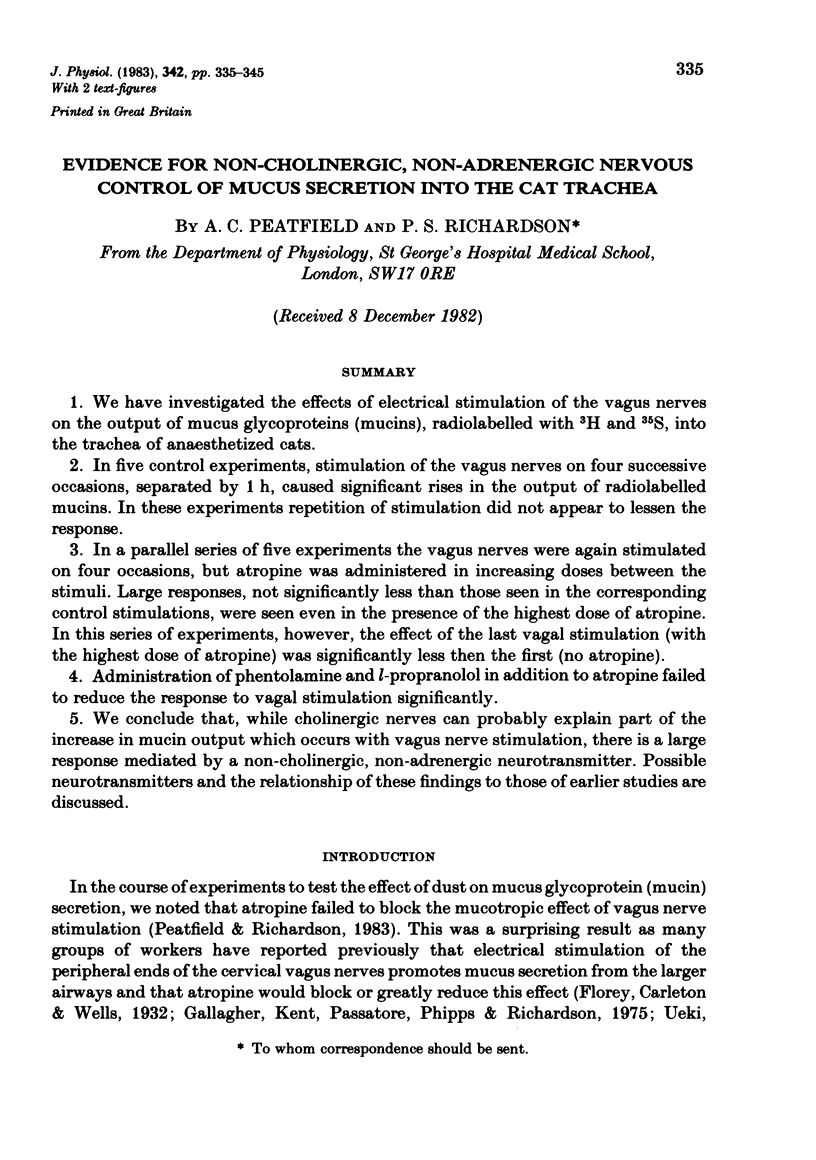
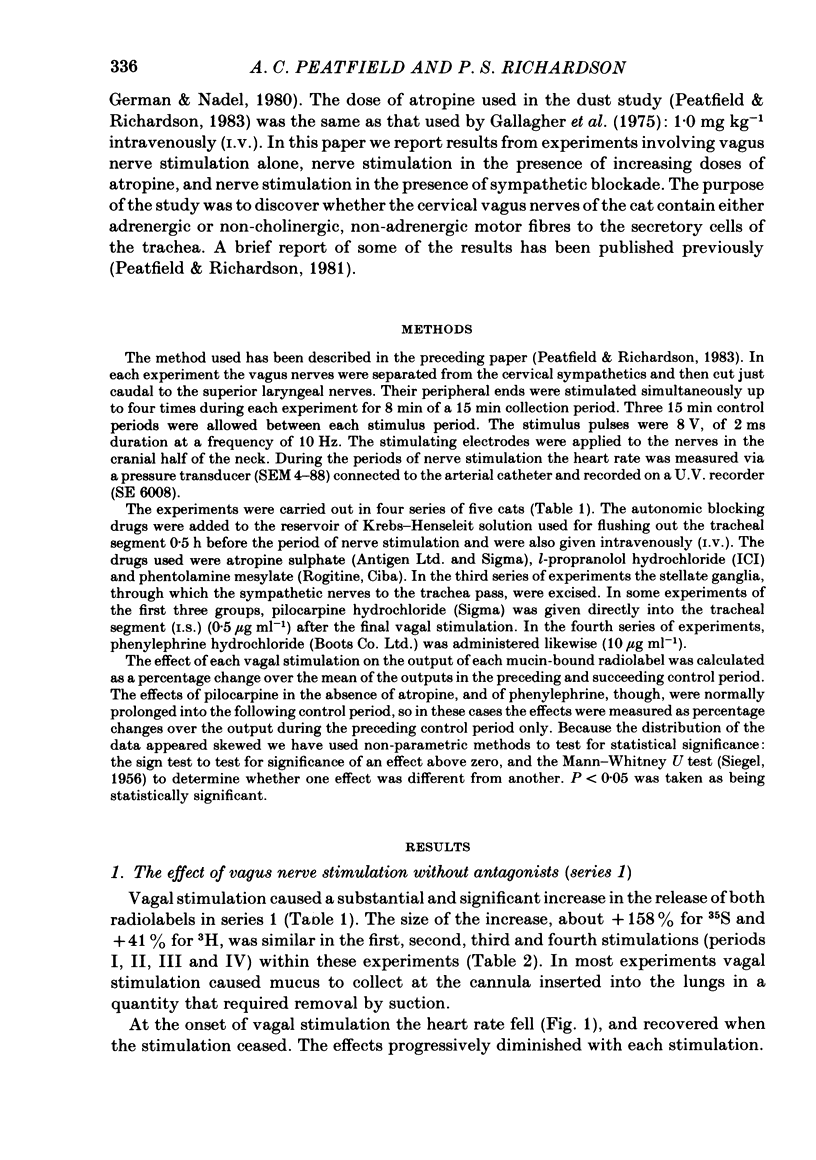
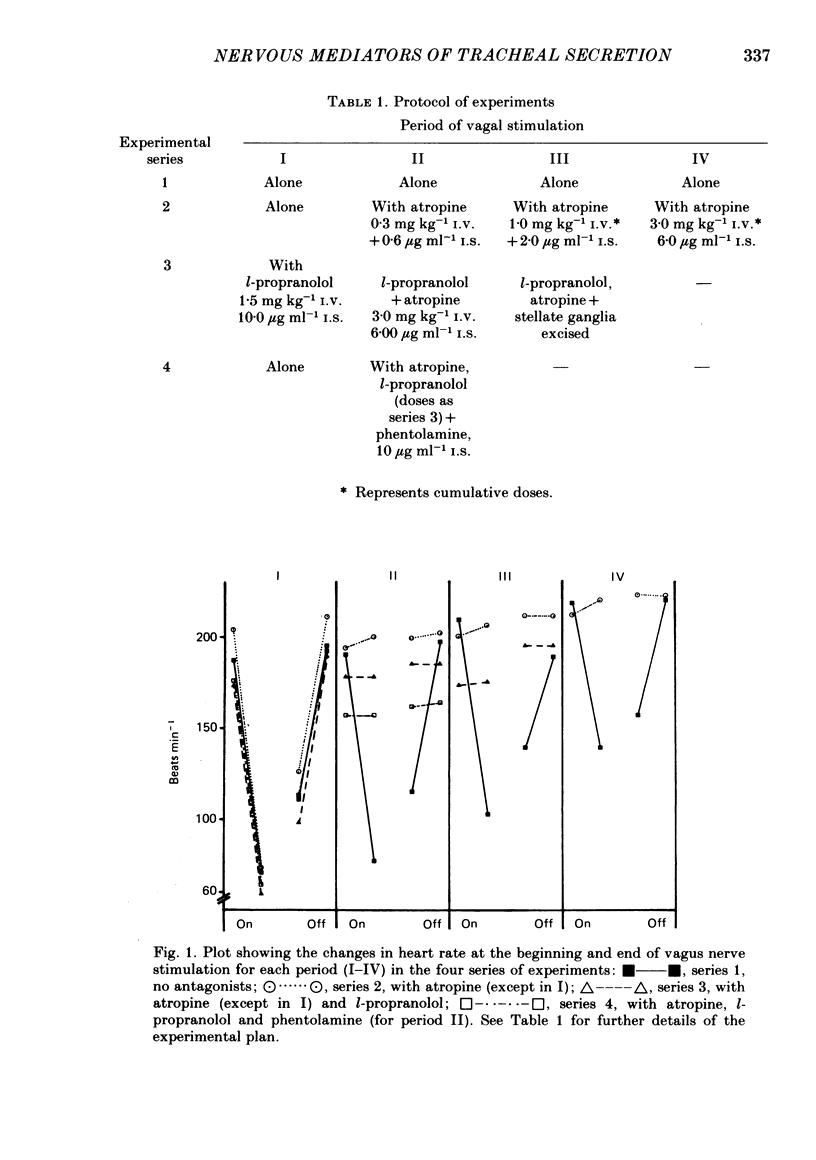
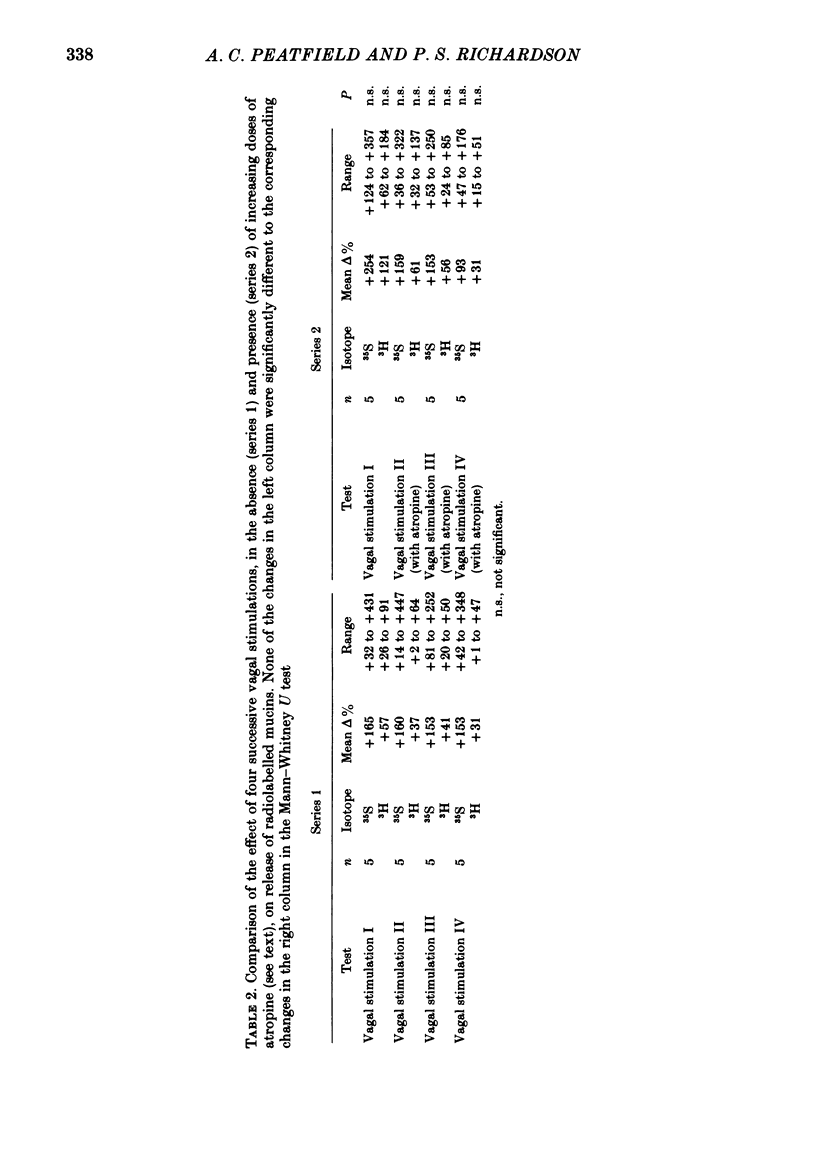
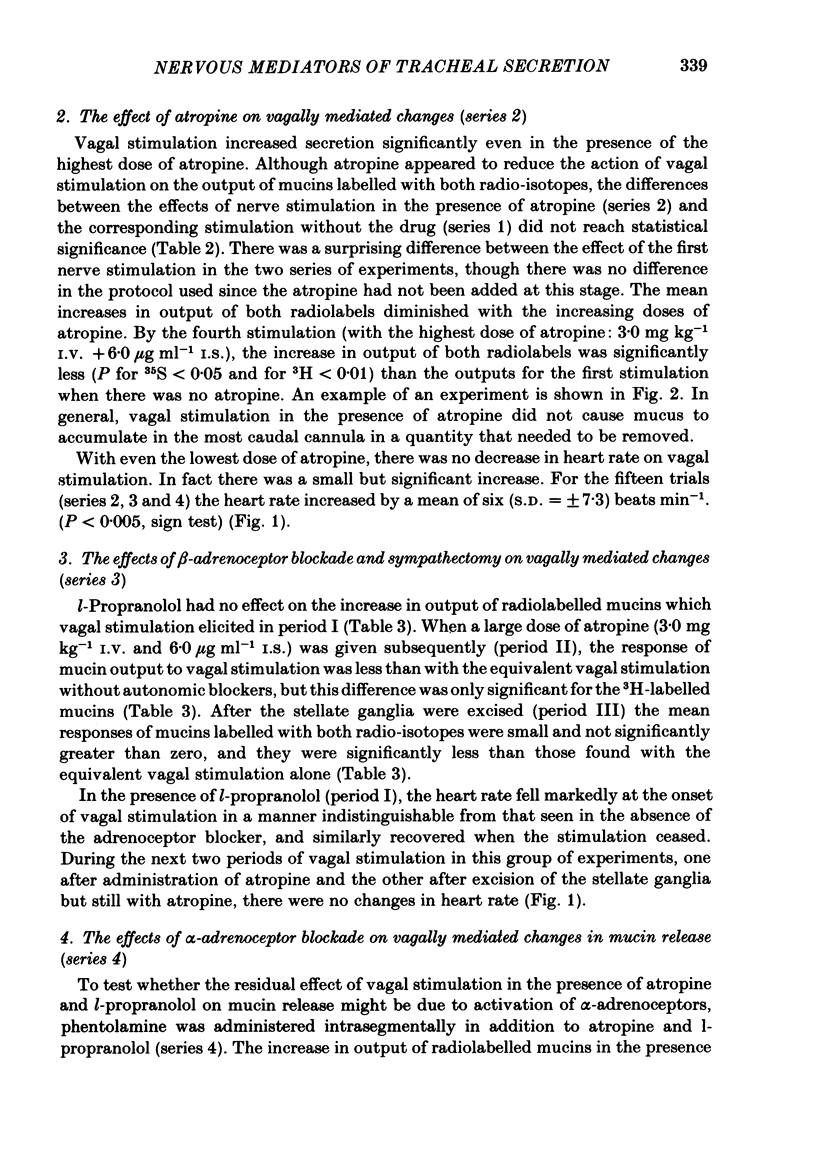
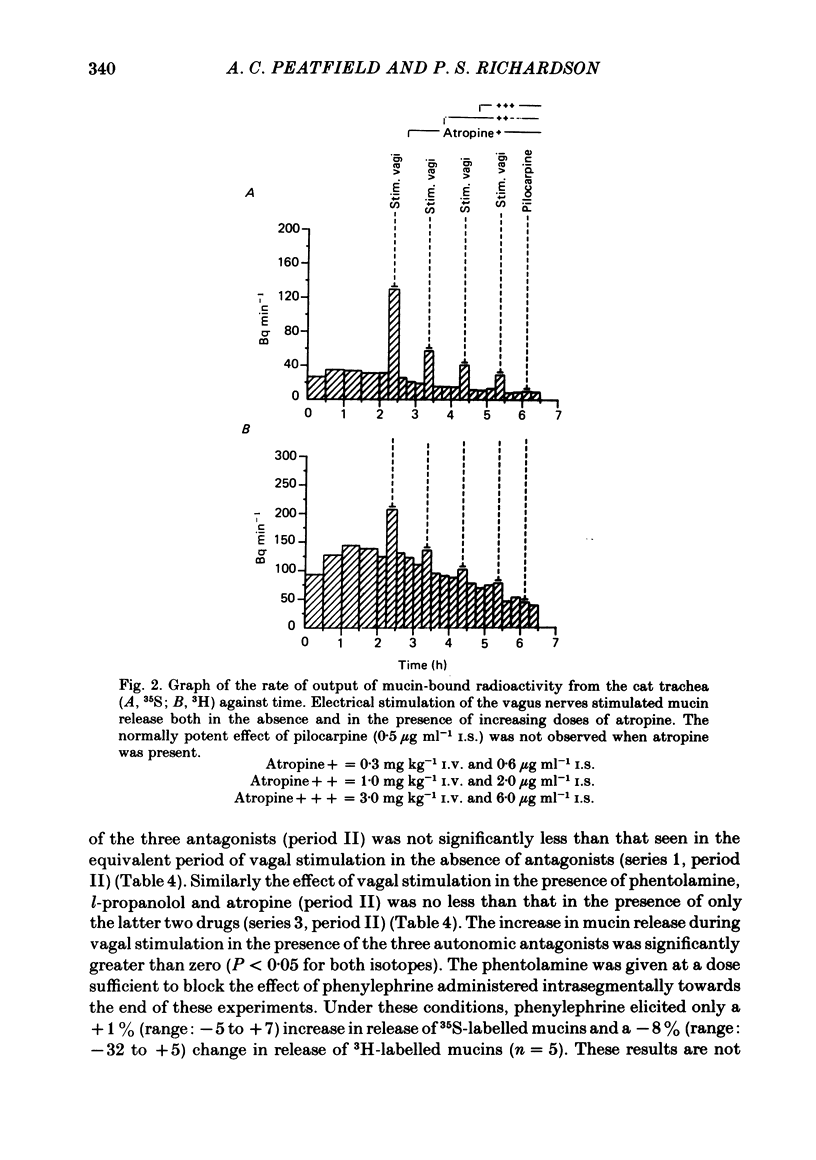
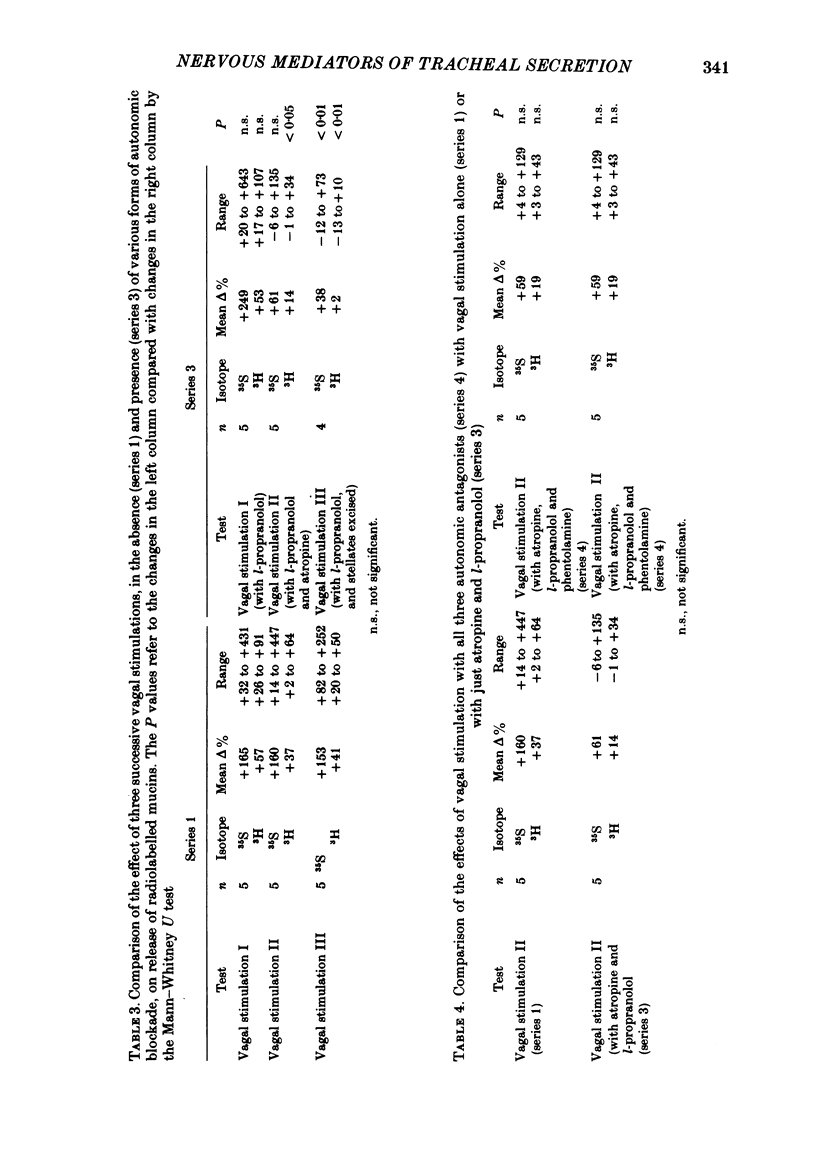
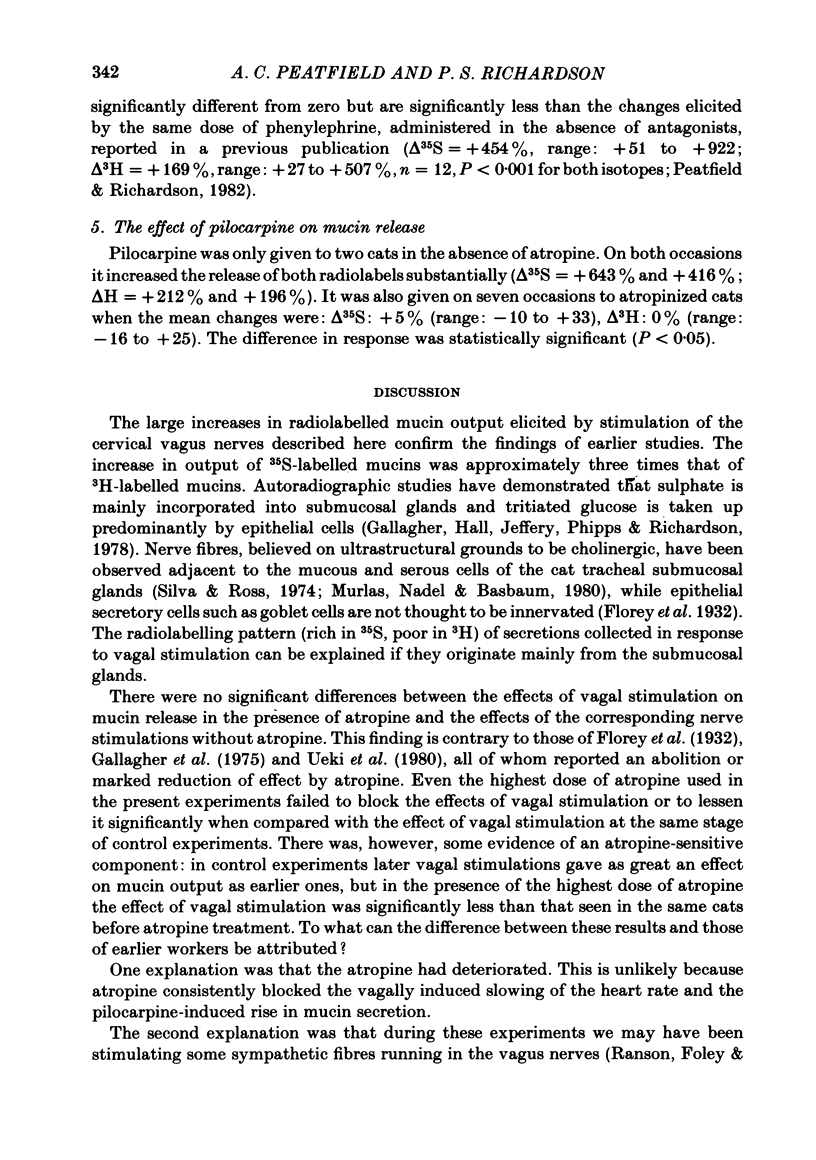
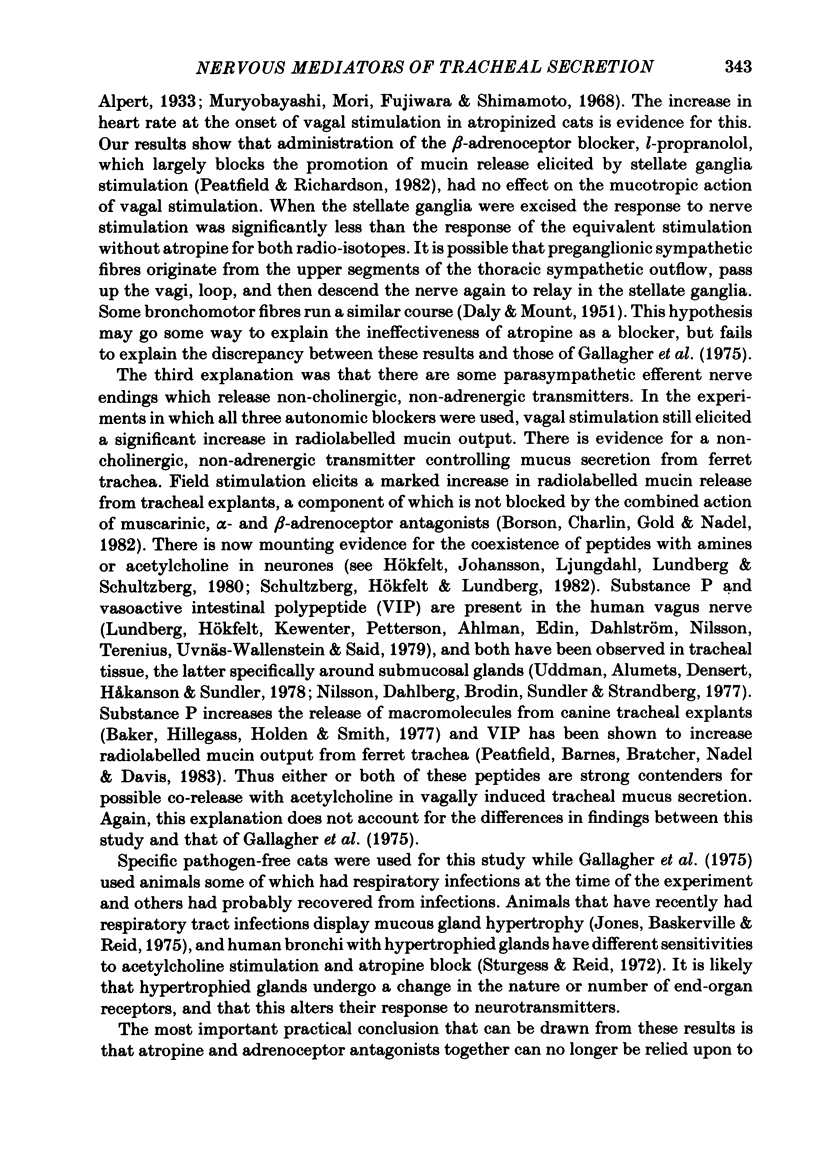
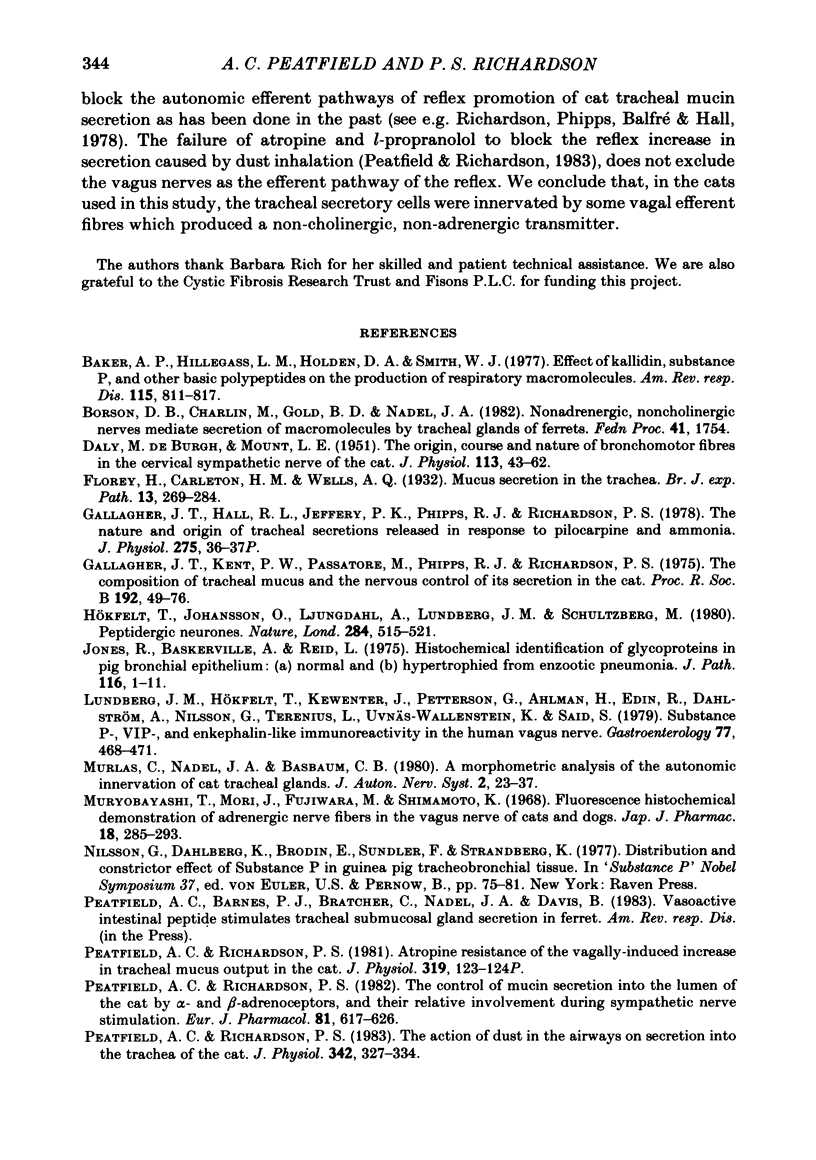
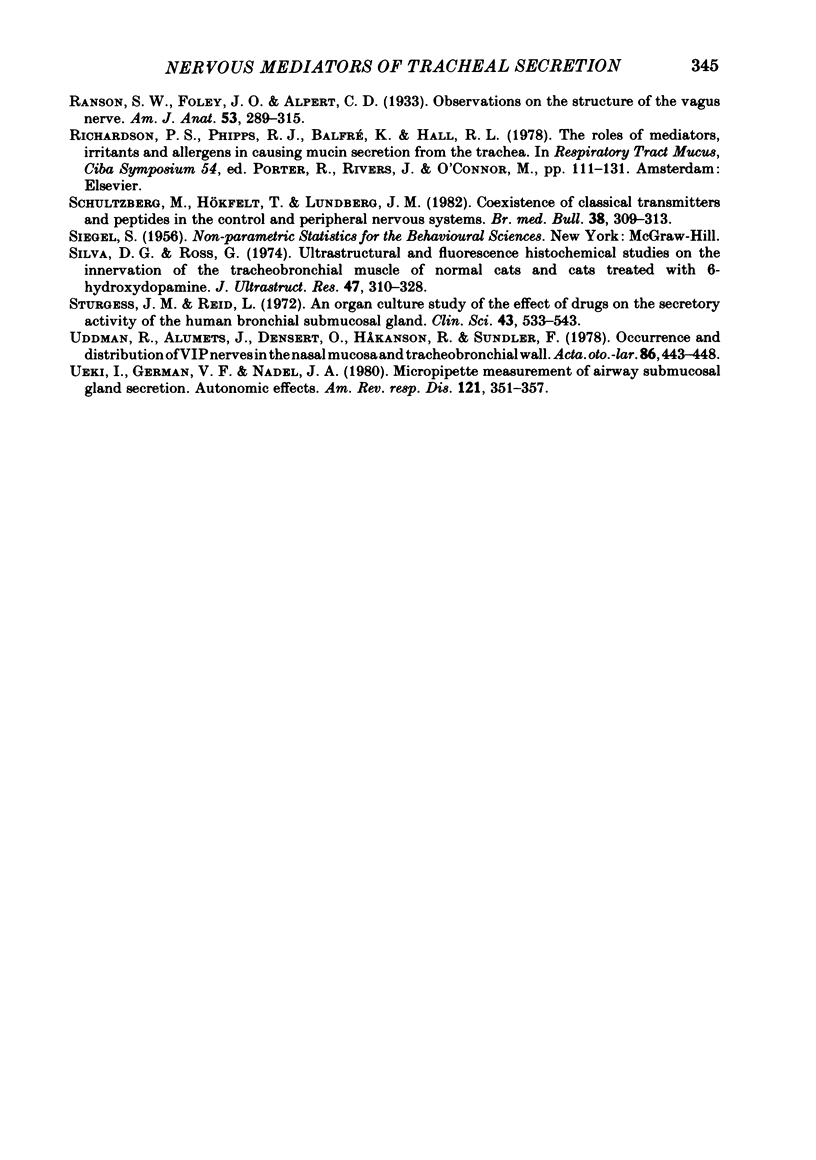
Selected References
These references are in PubMed. This may not be the complete list of references from this article.
- Baker A. P., Hillegass L. M., Holden D. A., Smith W. J. Effect of kallidin, substance P, and other basic polypeptides on the production of respiratory macromolecules. Am Rev Respir Dis. 1977 May;115(5):811–817. doi: 10.1164/arrd.1977.115.5.811. [DOI] [PubMed] [Google Scholar]
- DALY M. de B., MOUNT L. E. The origin, course and nature of bronchomotor fibers in the cervical sympathetic nerve of the cat. J Physiol. 1951 Mar;113(1):43–62. doi: 10.1113/jphysiol.1951.sp004555. [DOI] [PMC free article] [PubMed] [Google Scholar]
- Gallagher J. T., Hall R. L., Jeffery P. K., Phipps R. J., Richardson P. S. The nature and origin of tracheal secretions released in response to pilocarpine and ammonia [proceedings]. J Physiol. 1978 Feb;275:36P–37P. [PubMed] [Google Scholar]
- Gallagher J. T., Kent P. W., Passatore M., Phipps R. J., Richardson P. S. The composition of tracheal mucus and the nervous control of its secretion in the cat. Proc R Soc Lond B Biol Sci. 1975 Dec 31;192(1106):49–76. doi: 10.1098/rspb.1975.0151. [DOI] [PubMed] [Google Scholar]
- Hökfelt T., Johansson O., Ljungdahl A., Lundberg J. M., Schultzberg M. Peptidergic neurones. Nature. 1980 Apr 10;284(5756):515–521. doi: 10.1038/284515a0. [DOI] [PubMed] [Google Scholar]
- Jones R., Baskerville A., Reid L. Histochemical identification of glycoproteins in pig bronchial epithelium: (a) normal and (b) hypertrophied from enzootic pneumonia. J Pathol. 1975 May;116(1):1–11. doi: 10.1002/path.1711160102. [DOI] [PubMed] [Google Scholar]
- Lundberg J. M., Hökfelt T., Kewenter J., Pettersson G., Ahlman H., Edin R., Dahlström A., Nilsson G., Terenius L., Uvnäs-Wallensten K. Substance P-, VIP-, and enkephalin-like immunoreactivity in the human vagus nerve. Gastroenterology. 1979 Sep;77(3):468–471. [PubMed] [Google Scholar]
- Murlas C., Nadel J. A., Basbaum C. B. A morphometric analysis of the autonomic innervation of cat tracheal glands. J Auton Nerv Syst. 1980 May;2(1):23–37. doi: 10.1016/0165-1838(80)90004-1. [DOI] [PubMed] [Google Scholar]
- Muryobayashi T., Mori J., Fujiwara M., Shimamoto K. Fluorescence histochemical demonstration of adrenergic nerve fibers in the vagus nerve of cats and dogs. Jpn J Pharmacol. 1968 Sep;18(3):285–293. doi: 10.1254/jjp.18.285. [DOI] [PubMed] [Google Scholar]
- Peatfield A. C., Richardson P. S. The action of dust in the airways on secretion into the trachea of the cat. J Physiol. 1983 Sep;342:327–334. doi: 10.1113/jphysiol.1983.sp014853. [DOI] [PMC free article] [PubMed] [Google Scholar]
- Peatfield A. C., Richardson P. S. The control of mucin secretion into the lumen of the cat trachea by alpha- and beta-adrenoceptors, and their relative involvement during sympathetic nerve stimulation. Eur J Pharmacol. 1982 Jul 30;81(4):617–626. doi: 10.1016/0014-2999(82)90351-x. [DOI] [PubMed] [Google Scholar]
- Richardson P. S., Phipps R. J., Balfre K., Hall R. L. The roles of mediators, irritants and allergens in causing mucin secretion from the trachea. Ciba Found Symp. 1978;(54):111–131. doi: 10.1002/9780470720356.ch6. [DOI] [PubMed] [Google Scholar]
- Schultzberg M., Hökfelt T., Lundberg J. M. Coexistence of classical transmitters and peptides in the central and peripheral nervous systems. Br Med Bull. 1982 Sep;38(3):309–313. doi: 10.1093/oxfordjournals.bmb.a071778. [DOI] [PubMed] [Google Scholar]
- Silva D. G., Ross G. Ultrastructural and fluorescence histochemical studies on the innervation of the tracheo bronchial muscle of normal cats and cats treated with 6-hydroxydopamine. J Ultrastruct Res. 1974 Jun;47(3):310–328. doi: 10.1016/s0022-5320(74)90013-6. [DOI] [PubMed] [Google Scholar]
- Sturgess J., Reid L. An organ culture study of the effect of drugs on the secretory activity of the human bronchial submucosal gland. Clin Sci. 1972 Oct;43(4):533–543. doi: 10.1042/cs0430533. [DOI] [PubMed] [Google Scholar]
- Uddman R., Alumets J., Densert O., Håkanson R., Sundler F. Occurrence and distribution of VIP nerves in the nasal mucosa and tracheobronchial wall. Acta Otolaryngol. 1978 Nov-Dec;86(5-6):443–448. doi: 10.3109/00016487809107524. [DOI] [PubMed] [Google Scholar]
- Ueki I., German V. F., Nadel J. A. Micropipette measurement of airway submucosal gland secretion. Autonomic effects. Am Rev Respir Dis. 1980 Feb;121(2):351–357. doi: 10.1164/arrd.1980.121.2.351. [DOI] [PubMed] [Google Scholar]


